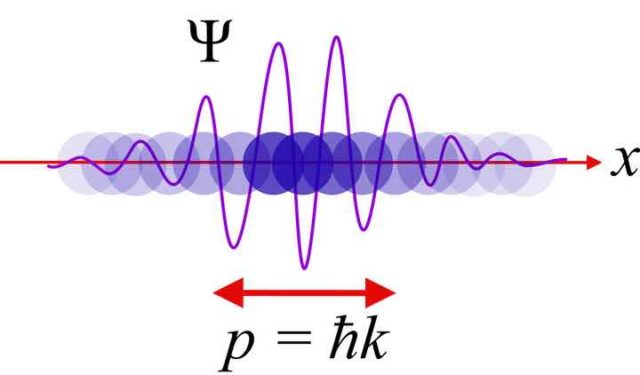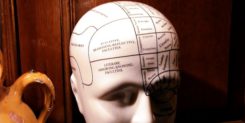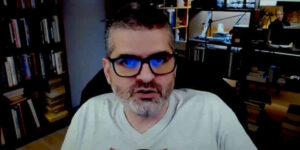Of all the strange things in this universe, quantum physics must be one of the strangest.
Even if you’re not interested in the science of quantum physics, there are interesting conclusions that may force us to change our understanding of the universe, human minds and reality.
Interested? Let’s check it out.
What is quantum physics?
Quantum physcis, or quantum mechanics, is a description of how very small particles like electrons behave. You might expect they’d behave the same as larger objects like footballs or bullets, but they don’t.
When we look at the world, matter looks real and solid. We can confidently measure how fast an athlete is running as well as whereabouts she is on the track. We can observe, and sort of understand, magnetic fields, radio waves and light rays. We understand these things so well that we can land a spaceship on Mars, land a bomb or a rocket with pinpoint accuracy (regrettably), and send messages around the world.
But tiny particles don’t behave so predictably. In fact, tiny particles may not be particles at all.
Things are still being discovered and worked out, and what follows is only one of several understandings of quantum mechanics, but it is the one most accepted by scientists. But it seems that at very small scales, some very strange things occur:
- An electron can generally be regarded more as a wave than a particle. But if we observe it, it then behaves like a particle.
- Before we observe an electron, we cannot know exactly where it will be, but can only know where it is more or less likely to be (this probabilistic description is called its “wave function”).
- If we observe the electron or measure its location, we then know where it actually is (this is known as “wave function collapse”), we cannot at the same time know how fast it is travelling (Heisenberg’s Uncertainty Principle).
- Light, on the other hand, which we might think of as a wave, sometimes behaves as if it is small particles (photons).
So electrons and other small particles behave like waves when we aren’t looking at them, but behave like particles when we are looking at them.
Physicist Sean Carroll, sums it up: “There is a fundamental divide between what nature really is and what you see when you look at it.”
This is a quite mind-boggling fact! And it has some interesting implications.

A challenge to materialism
Materialism is the view that everything that exists is matter. There are no gods or fairies or ghosts, only things that are made of physical stuff. (Naturalism and physicalism are similar concepts.)
And materialism is the basis of much science and of modern thinking. Generally speaking, scientists assume materialism and in fact can only measure material things.
But astrophysicist Adam Frank argues that quantum physics poses some real difficulties for materialism.
What is matter?
Matter is the basis of materialism, but what is matter? If an electron is best considered as a wave, can materialism be based on a wave? And if it can change from being a wave to being a particle when it is observed, can this ephemeral thing be the basis of a worldview?
And what defines an observation or measurement? A scientist watches the path of an electron in a cloud chamber and sees the electron as a particle, even though before he was able to observe it the electron was behaving as a wave. But what if a dog watched it, or a camera. Would the wave function still collapse?
(Some quantum physics texts say the wave function collapse requires an “interaction with the external world”, but it seems that most interpretations require an observer.)
Materialism as a philosophy seems to be standing on a very flimsy foundation.
What is a mind?
The nature of our minds and consciousness is a long-standing philosophical and scientific question. Materialists say that our minds are just products of our brains. And our consciousness, our selves, are just the activity of the physical neurons in our brains.
But if our neurons are not actually matter but waves, then the mind and consciousness become more mysterious.
The observer is critical in quantum physics, for observation changes the things being observed. And the observer is the mind of the scientist studying the electron or photon. But if that mind is, at its core, not made up of particles but waves, then we have a strange outcome. For a materialist, the mind depends on the brain, which is matter. But that matter depends on the mind of the observer (which isn’t matter) to determine whether it is particle or wave.
So quantum physics suggests that materialism doesn’t address the fundamentals of the universe – the observer is more fundamental than matter. Again, materialism seems to be less assured than materialists would wish.
Alternatives to materialism
If our universe isn’t all matter, what else is there? There seem to be two basic alternative views.
Dualism – both matter and mind
To the layperson, this seems to be a logical viewpoint. Intuitively, it seems that minds are real and so is matter. So why not accept that this is the case?
Materialists and most scientists are suspicious of dualism because we can only measure the material, so why think there is something else? But the obvious answer to that is, if we cannot use science to measure the non-material, then we cannot use it to say it doesn’t exist. So since our subjective experience indicates that there is something more than the material in being human, why not accept our experience at face value?
And so dulists can say that the observing mind so important in quantum physics is real.
Dualism comes in two basic forms.
- Theism: A supernatural mind created a universe which includes both matter and mind.
- Naturalistic dualism: The natural world includes both matter and mind. Physical substances have both physical and mental properties.
Both these views seem to fit better with quantum physics than does materialism.
Everything is really mental
This view too comes in two basic forms.
- Panpsychism: Everything in the universe is really mental, but appears physical to us. So even atoms are conscious in some way.
- Idealism: The material things we see really are material, but are manifestations of a higher reality which is mental.
Both these views are difficult for most people to accept – they seem to be far removed from our common experience. Nevertheless, Idealism seems to be compatible with quantum physics, but I’m less sure about panpsychism.
Materialism on the defensive?
A small but growing number of scientists and philosophers are looking for alternatives to materialism that better explain our common human experience and provide a better basis for ethics and humanity.
It seems that quantum physics may be adding another reason to think again about materialism.
Read more
- Minding Matter. Prof Adam Frank, Aeon Magazine.
- The Biggest Ideas in the Universe | 7. Quantum Mechanics. Sean Carroll on Youtube.
- A challenge to materialism? On this website.
Graphics: Main graphic: a diagram that illustrates the dual nature of light and matter (Wikipedia). Smaller graphic: interference pattern produced by double slit experiement, which demonstrates the dual nature of light (Jordgette in Wikipedia).





Hi Eric!
I love reading about Quantum physics and Cosmology…. it’s just a pity I don’t understand 95% of it ??.
Philosophy of mind and neuroscience is fascinating to me but I’m not really in any camp of thought. Although I do like the idea of idealism. I personally do believe science works best alongside philosophy and metaphysics and would like to see a return to valuing how both can enrich our approach to science.
Have you ever read or watched David Bentley Hart? Although I’m a agnostic, I find him immensely insightful and intellectually vigorous. Theology, history, metaphysics and philosophy of mind are his primary interests and personally I like how he values both spirituality and science and rejects the largely manufactured culture war between them. You may find his work highly interesting considering your interests and approach. One of the most interesting things I find about his approach to philosophy of mind is his rejection of both physicalism and dualism.
Hope you and your family are well Eric !
Aaron
Yes, I find these topics fascinating, and the talk by Sean Carroll is very illuminating.
Science and other academic study has of necessity become very specialised, but it means it is harder to have a holistic picture of humanity or the world. Different disciplines respecting each others and working together on the big picture would be a great step forward, but it seems many scientists and science-followers think philosophy is a failed discipline and not very useful. I think they are mistaken.
Coincidentally, David Bentley Hart was in Australia recently and having an interest in indigenous people, there was a public event where he and two First Nations pastors/leaders were interviewed together. It was very illuminating, and he certainly came across impressively. Have you any particular references you’d recommend?
Family and I are well but busy. Hope life is good for you too!